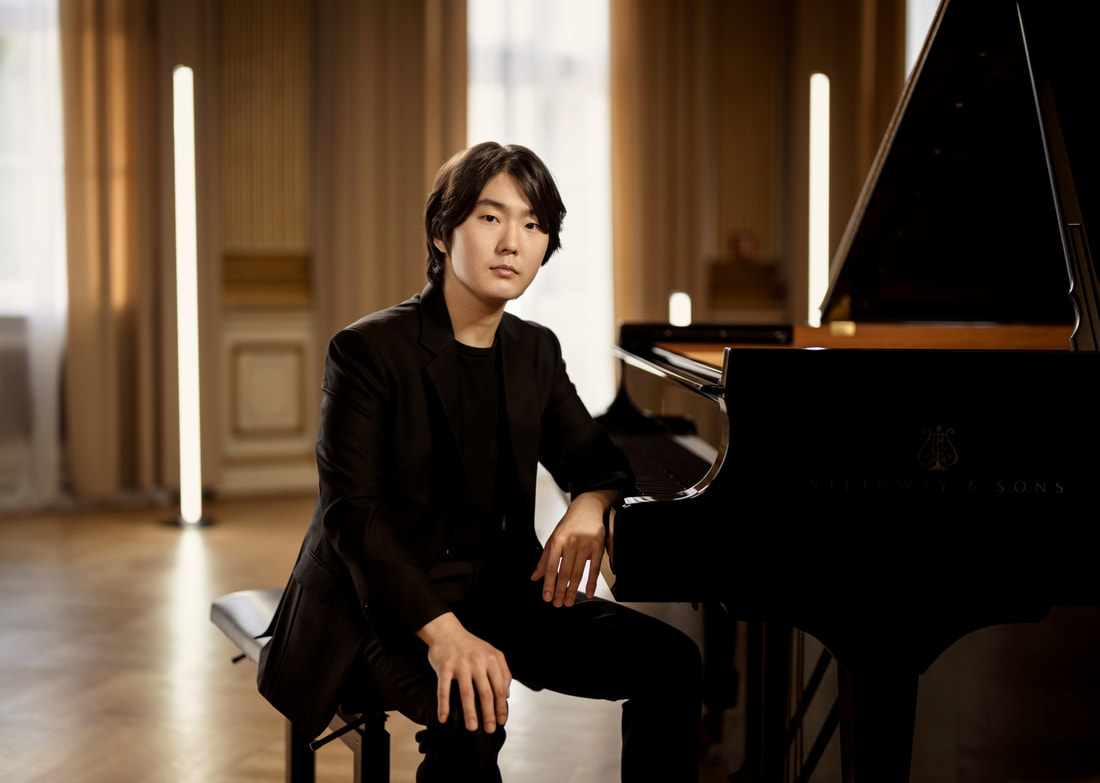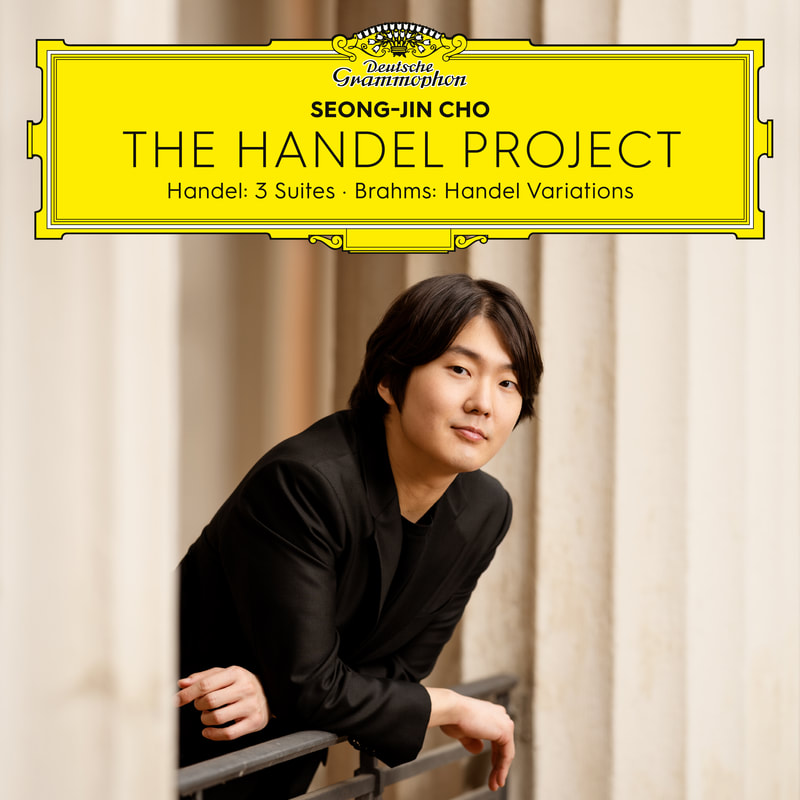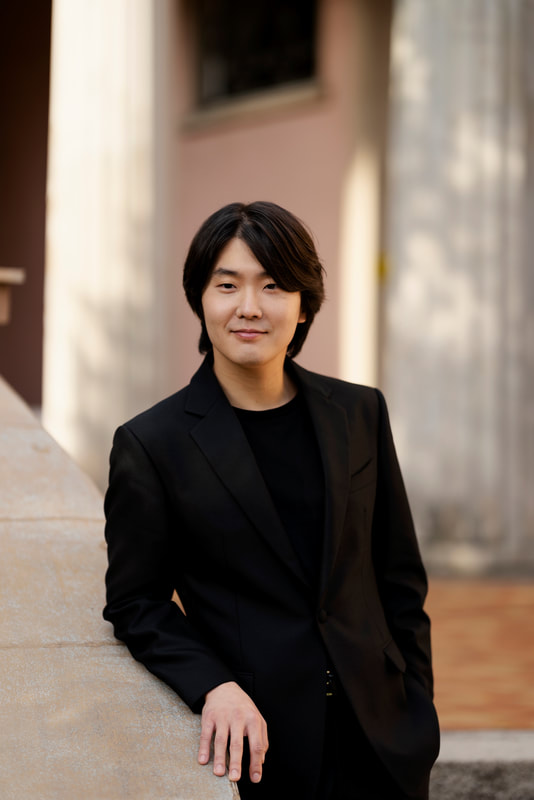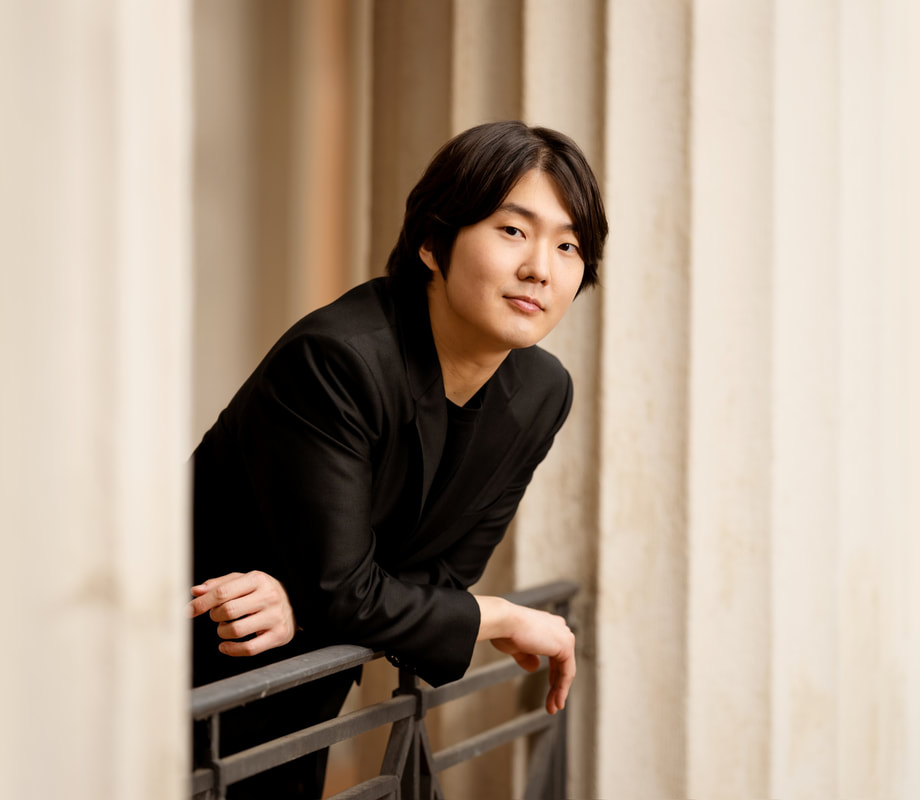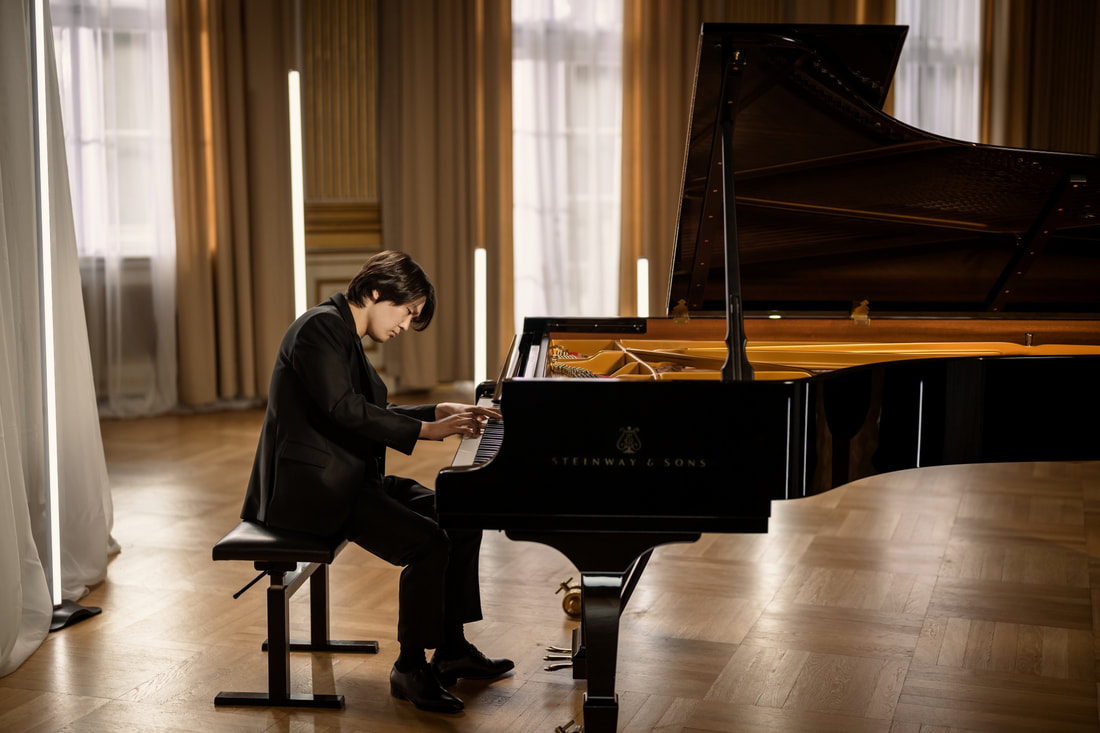|
ARTICLE IN: 한국어 바로가기 ©Universal Music Pianist Cho Seong-Jin, the first Korean winner of the Chopin International Piano Competition and a renowned pianist of his generation, has recently released his latest album titled "The Handel Project" after a two-year hiatus since his previous release. This album showcases the works of Handel, a celebrated composer of the Baroque era, deviating from Cho Seong-Jin's usual focus on classical music. It features three favorite pieces from Handel's Harpsichord Suites, which were published in London in 1720. In this album, Cho Seong-Jin offers a modern interpretation of these pieces. He deliberately limits the use of the sustain pedal and adjusts the dynamics to convey Handel's counterpoint using a wide range of colors and weight. The album begins with "Suite No.2 in F Major HWV 427" and progresses to "Suite No. 8 in F Minor HWV 433" and "Suite No. 5 in E Major HWV 430," culminating in the well-known last movement, "The Harmonious Blacksmith." In addition to Handel's Harpsichord Suites, the album includes Brahms' "Variations and Fugue on a Theme by Handel." Cho Seong-Jin considers it the "most perfect variation work." Composed in just a few weeks in 1861, it consists of twenty-five variations based on Handel's Aria (Air) from Suite No. 3 in B-flat Major HWV 434, showcasing a wide range of emotions. The album features two movements from Handel's music book published in 1733, namely "Sarabande in B-flat Major HWV 440/3" and Wilhelm Kempff's arrangement of "Menuet in G Minor." To promote his latest album "The Handel Project," Cho Seong-Jin is embarking on a global tour and conducted a virtual interview at Universal Studio in Berlin on the day of the album's release. Deutsche Grammophon© Q: Apart from your live performances, this is your 6th studio album and 8th recording debut after an 8-year gap. While you have previously combined classical and romantic genres, this is your first time introducing Baroque music. Can you explain why you chose Handel over Bach? A: I felt that I wasn't yet ready to record Bach. Bach's music is more intellectual and complex, whereas Handel's keyboard works have a more melodic aspect that appealed to me. As someone with limited exposure to Baroque music, Handel seemed more approachable. However, as I delved into it, I discovered that Handel's music is not easy either. When I was younger, I attended the Seoul Art Center Youth Academy, and my teacher advised me to practice all of Bach's Well-Tempered Clavier and Beethoven's complete sonatas. Now, as I approach the end of my 20s, I'm beginning to understand the significance of his advice. Learning Baroque music, including Bach's works, requires a considerable amount of time and dedication. I practiced more intensively than ever before when preparing for Handel, especially during February when the tour was canceled, allowing me to dedicate 7-8 hours a day to practice. Q: Among Handel's compositions, you focused on selections from one book (3 pieces), another book with 2 pieces (1 movement each), and arrangements from the first volume of the Wilhelm Kempff version, which were written over a span of 13 years. How did you choose these pieces, and how are they related to the album titled 'Handel Project'? You previously mentioned your desire to challenge Brahms in your 30s. Is this album connected to that aspiration? A: I bought and played through books 1 and 2 of Handel's works from beginning to end, selecting the pieces that resonated with me after spending the whole day playing. It's challenging to explain why certain pieces appeal to me, but it's relatively easier to express why I dislike a piece. There is no specific intention behind my selection process. As for my previous mention of wanting to play Brahms in my 30s, I now realize that I may have spoken too soon back in 2018. Although I had the opportunity to play Brahms later on, I refrain from making age-based statements about my future plans. Q: In your opinion, what is the most significant difference between the harpsichord and the modern piano? Were there any specific aspects you focused on while working on this album? A: In the past, I used to admire the wonders of Baroque music but found it incredibly challenging. It wasn't until last January, when a harpsichord player from Switzerland offered me much-needed guidance, that I began to gain a deeper understanding. As you may know, the harpsichord and the modern piano differ greatly. While both instruments utilize strings, the harpsichord plucks the strings, while the piano strikes them. Essentially, they are entirely different instruments. The ability to control dynamics is a major factor that distinguishes the modern piano. Personally, I found playing the harpsichord quite difficult. On the other hand, playing the modern piano provides numerous advantages in terms of expression. Whether Handel and Bach would have preferred the modern piano version is open to speculation. However, one thing is certain - the range of interpretation in Baroque music is extensive. Some musicians approach it with a romantic sensibility, while others adopt a more analytical approach akin to Glenn Gould. As for me, I prefer to interpret it in my own unique way. Q: While working on this album, you were inspired by Trevor Pinnock's performance. When studying and recording new pieces, do you also refer to recordings by other performers? A: I wouldn't say that I "refer to" other performers' recordings directly, but as someone who thoroughly enjoys listening to music, I happened to come across Handel while listening to Trevor Pinnock's complete works. I even recall purchasing the sheet music at that time. However, once I start learning a piece, I tend to avoid relying heavily on other musicians' interpretations. While we do listen to some recordings once the piece is complete and we start touring, during the learning process, I try not to let other pianists' interpretations excessively influence my own approach, as it can undermine the development of my own mastery of the craft. ©Universal Music Q: In this digital age where the listening environment has changed significantly, how do you usually enjoy classical music? A: I still buy a lot of CDs and listen to them. I'm not particularly fond of listening to music on a plane or in similar situations. Although I don't have a Spotify account, I find YouTube great because it allows me to watch performance videos. While there aren't many people around me who share the same interest in classical music, I think it's positive that the environment is changing. Similar to the transition from LPs to CDs, there were initially many people resistant to change. There may still be some who dislike the shift to streaming, but personally, it feels natural to me. Q: As a professional pianist, how do you measure your success? A: I've noticed a recurring theme in interviews recently, with questions about the secret behind the success of Korean musicians. Perhaps it feels unusual in the European music market to consider Asian performers, just as a foreigner playing traditional Korean music might seem out of place. Personally, I believe that many Korean musicians are exceptional, which is why they receive attention. When asked about the high participation of Koreans in competitions, it's difficult to stop it. While I'm not particularly fond of competitions, they can be an easier path to opportunities. However, this perspective doesn't seem to be widely covered in articles. Regarding success, I'm not entirely certain. I view music and career as separate entities. Making good music doesn't guarantee a successful career. Speaking of career, I feel that I have achieved a lot. At this point, who I collaborate with holds more importance to me than fame. It's essential to work with someone who connects with your heart, regardless of reputation. Q: During the third year of the pandemic, while many were feeling discouraged, you maintained an unwavering sense of performance and embarked on tours in the United States and Europe. You became one of the busiest musicians overseas despite the pandemic. How have you been doing during these days? A: During the first year of the pandemic, I felt anxious and experienced an unprecedented situation. I mainly performed live online and stayed at home. However, I found it enjoyable to spend time alone, playing various pieces using the scores I had purchased. During this period, Handel's music particularly moved me. Although I didn't consult with my management, I considered recording something two years later, in 2020. In January of this year, I was mostly in the United States, collaborating with the Philadelphia Orchestra and the National Symphony Orchestra in Washington, and performing recitals in Seattle and Los Angeles before returning home. Later, I performed in Frankfurt. I have been keeping myself as busy as before the pandemic. It took me about a year to adjust, but now it feels similar to the time before the pandemic. I once again enjoy being busy, feeling alive, and experiencing many things that motivate me. Q: Throughout your long career as a pianist, have you ever experienced a slump? What is your secret to pursuing your passion for a long time? When expanding your repertoire with unexpected choices like Berg's Sonata or Handel, what concerns do you have? A: First and foremost, I don't have concerns about repertoire because there are countless pieces to explore. I simply have to try everything. If there is any concern, it's the lack of time. I have to learn new pieces while on tour, so when I'm at home, I try to practice as much as possible. I often wish there were 30 hours in a day. In 2013, when I was in Paris, there was a period when I wasn't in a slump but couldn't concentrate. Before playing Chopin's piece, I tried to identify my mistakes by recording myself. I followed the advice of many people, but I stopped doing that a few years ago. I realized that subjective judgments like "Oh, this is wrong" can also be made. While it helped improve my concentration, it made me feel like I wasn't fully present in my performances. I love what I do, and I didn't anticipate being so busy as a pianist. I enjoy the busyness, traveling on tour, and working hard. It gives me a sense of purpose, and it aligns with my personality. Discovering new repertoire brings me the same joy. I love being busy and finding new pieces that thrill me. Q: Handel's piano pieces are not usually chosen for casual listening, but it seems that your new repertoire is generating increased interest in Handel. As a musician with such influence, do you have a role you want to fulfill in the classical music industry? A: As a young musician participating in competitions, I was initially drawn to pieces with flashy techniques. However, studying works like Handel's has taught me that there is value in pursuing repertoire beyond the flashy ones. The "Handel Project" felt like a natural fit for me, as if I was instinctively drawn to Baroque music. While it may sound self-centered, the reason I play the piano is simply because I love it. I don't aspire to have a specific role in the classical music industry, and I would rather not have one. What matters to me is presenting good music, great music to the audience, and sharing my passion with others. Universal Music© Q: Last year during your US concert tour, there was a situation where you lost your trunk and ended up playing in casual clothes. Can you tell us more about what happened? A: During the tour, I had to travel from Berlin to San Francisco via Paris since there was no direct flight available. Unfortunately, the flight from Berlin to Paris was delayed, causing my luggage to not make it to San Francisco on time. Given my tight schedule, I decided to have my luggage sent to Taiwan instead. I received a lot of help during this time. For my first concert in the US, I had to wear workout clothes while performing on the piano. The next day, I borrowed a suit from someone for the concert. In Boston, my friend and pianist Shin Chang-Young kindly lent me a performance outfit. I relied on the generosity of others and managed to complete the US tour. Q: Have there been any particularly moving moments for you as a pianist? A: There was a moment that deeply moved me during a performance. Last year, I had the opportunity to perform a duet at Carnegie Hall. I had to substitute for a Russian pianist due to the war. I stayed up all night to practice and had to undergo a COVID test upon arrival, which made me quite nervous about the potential outcome. I don't remember much about the performance itself because of the nervousness. However, after it concluded, I hugged conductor Yannick, and that moment was truly moving for me. Q: In a previous response, you mentioned wishing there were 30 hours in a day. If you had more time, how would you like to spend your day? Also, now that you have turned 30, do you feel any changes in your mindset? Where do you find happiness? A: If there were 30 hours in a day, I would have more time for practice and rest, and I believe I would adjust to jet lag more quickly. If I ever returned to Korea, I might even gain an extra day to explore. Although I thought turning thirty would be a significant milestone, it feels somewhat similar to a few months ago. Happiness is always on my mind, and I often discuss it with my friends as well. However, sometimes the pursuit of happiness can feel like an endless quest. That being said, the happiest moments for me are when I return home after a tour. I'm not much of a social person, so being at home and learning new music brings me joy. I enjoy watching dramas and movies, and I'm a big fan of classical music. Although my friends often introduce me to K-pop, I'm not very familiar with many groups. Whenever I have spare time, I listen to a lot of classical music. While on a plane, I usually watch dramas or movies instead of listening to music, and lately, I've been enjoying the Netflix series "The Glory." Q: After the March recital, you have a recital tour scheduled to return to Korea in July, marking a two-year gap since your last performance there. Could you give us a glimpse of the program you have prepared? A: The recital tour will consist of a total of five performances in both March and July, with two concerts in Seoul and three in other cities. The program will include Russian works by Handel and Gubaidulina, as well as Chaconne and Handel variations. I find that Gubaidulina's Chaconne, although not the exact same music, has a Baroque structure and variations that complement Handel. In the second part of the program, I will perform some of Brahms' piano pieces and some of Schumann's Symphonic Etudes, selected from a collection of 76 pieces. This program revolves around the themes of Baroque and variations. The second program will feature Ravel's piece "Mirror." In the first part, we plan to perform "Brahms and Ravel," and in the second part, the focus will be on "Schumann Symphonic Etudes." ©Universal Music Interview by Glenda Park, Editor-in-Chief at Avec G. *This article is simultaneously published in Seoul Wire's 'Glenda Park's Blue Ocean'. ⓒ"Avec G". Unauthorized reproduction and redistribution are prohibited.
0 Comments
Your comment will be posted after it is approved.
Leave a Reply. |
